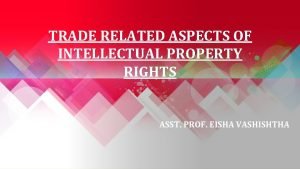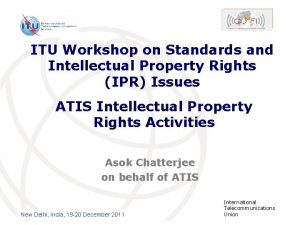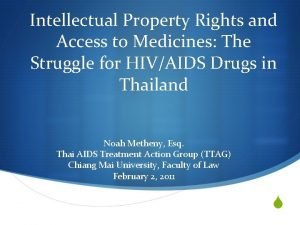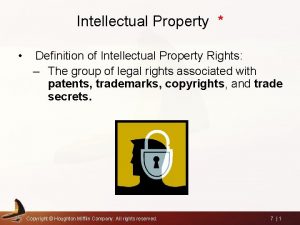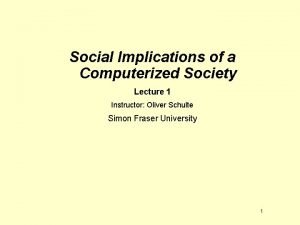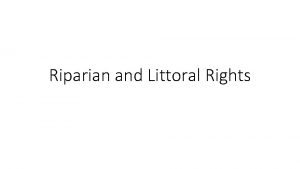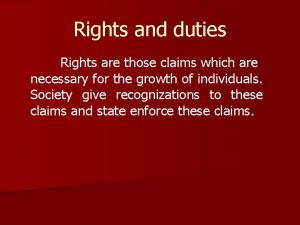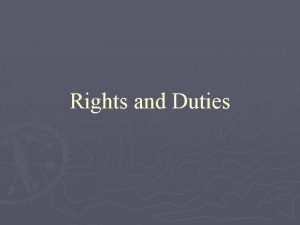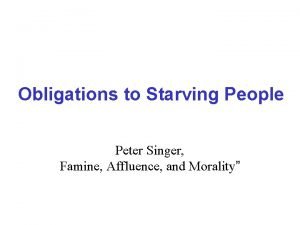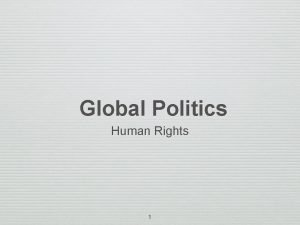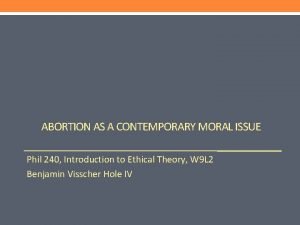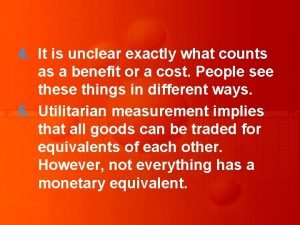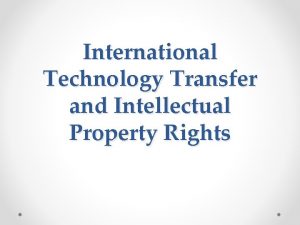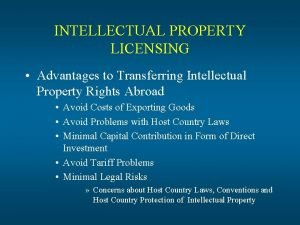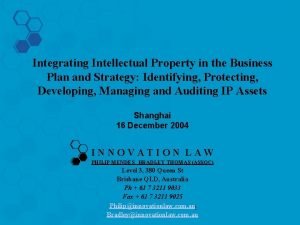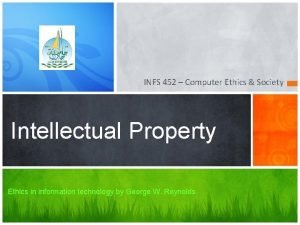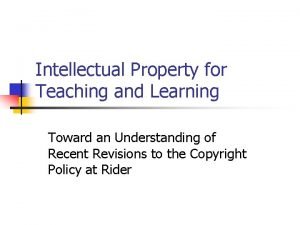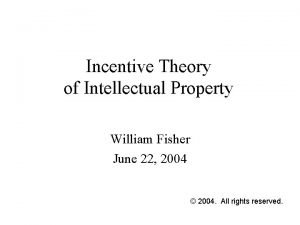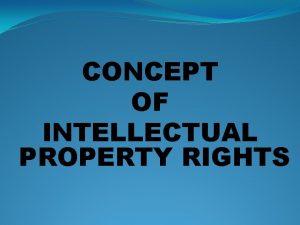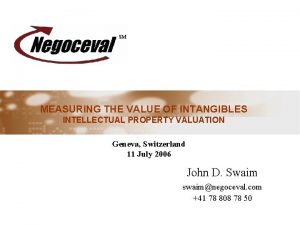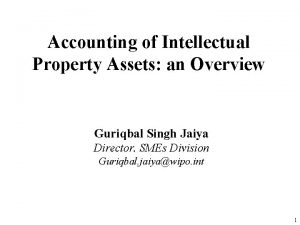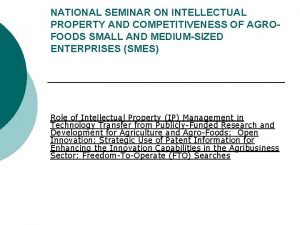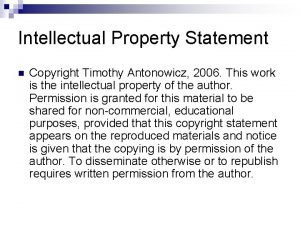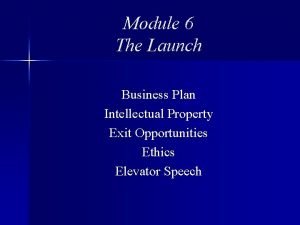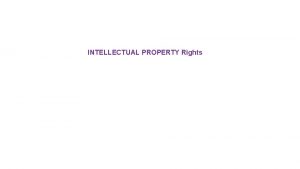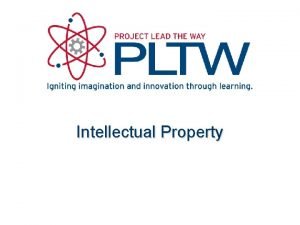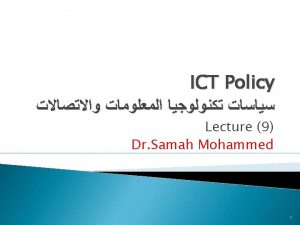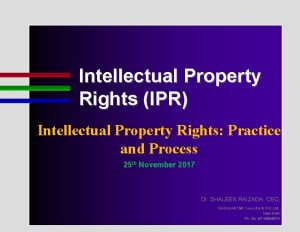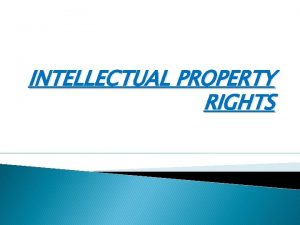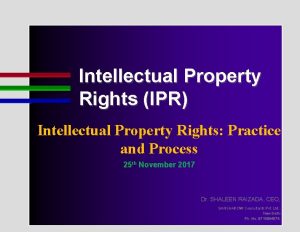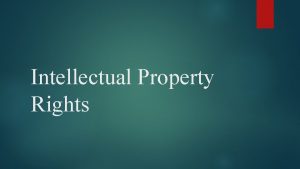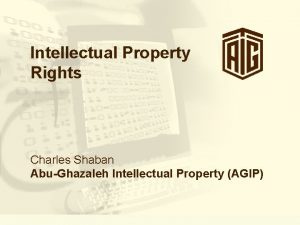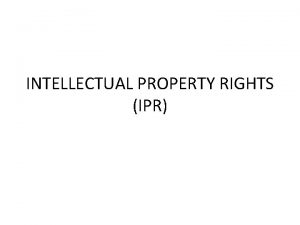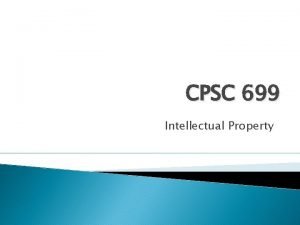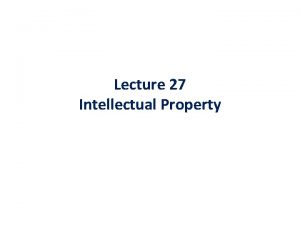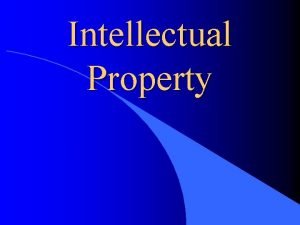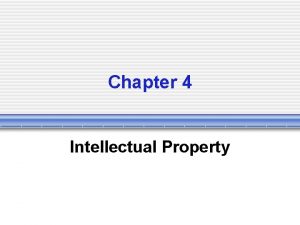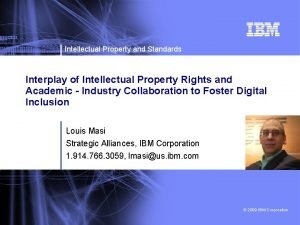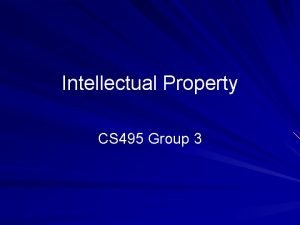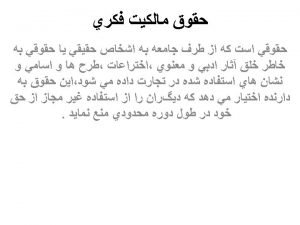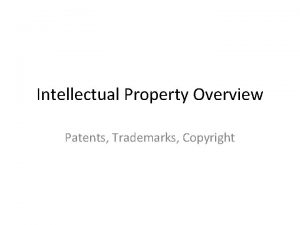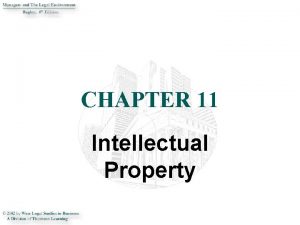Intellectual Property Definition of Intellectual Property Rights The



























- Slides: 27

Intellectual Property * • Definition of Intellectual Property Rights: – The group of legal rights associated with patents, trademarks, copyrights, and trade secrets. Copyright © Houghton Mifflin Company. All rights reserved. 7 |1

Patents • Patents are the primary means of protecting an original invention. • Designed by Thomas Jefferson in 1790 to provide a brief legal monopoly to give the inventor an opportunity to get the invention into the market and recoup development costs before competitors entered the market. Copyright © Houghton Mifflin Company. All rights reserved. 7 |2

Patents Protect Inventions You need a patent if: • • You have invented a product you want to market yourself or sell to a manufacturer. You believe someone else could sell the product by copying your invention. Patent application must include: § § § In-depth description of invention. Drawing of invention. Completed “Declaration for Patent Application. ” Notarized statement from inventor. Filing fee to U. S. Patent & Trademark Office. Copyright © Houghton Mifflin Company. All rights reserved. 7 |3

PROTECTING PRODUCTS AND SERVICES Patent = an exclusive right to an invention • Patents – Two Types – Utility Patents • • (functional) toys, coatings, tools, machines good for 20 years – Design Patents • • (nonfunctional) a decoration, apparel, jewelry Can easily be designed around. . . no functionality to protect Copyright © Houghton Mifflin Company. All rights reserved. 7 |4

Four Rules of Patentability The invention must fit into one of the five classes established by Congress for utility patents: A. B. C. D. E. Machine (fax, rocket, electronic circuits) Process (chemical reactions, methods for producing products) Articles of manufacture (furniture, diskettes) Composition (gasoline, food additives) A new use for one of the above It must have utility – in other words, be useful. It must not contain prior art. Prior art is the state of knowledge that is publicly available or published prior to the date of the invention. The invention must not be obvious to someone with ordinary skills in the field. Copyright © Houghton Mifflin Company. All rights reserved. 7 |5

Pathway to a Patent • File a Disclosure Document (Disclosure Statement) – – • File a Provisional Patent Application – – – • Establishes date of conception of idea (who has the rights? ) Get a two year grace period Protect your ideas while talking to manufacturers/potential funders Can use the term “patent pending” on the invention Only good for 12 months. . . then must file non-provisional application File Non-Provisional Patent Application – – – File complete description with the PTO (Patent & Trademark Office) “patent applied for” good for two years’ of protection Denials allow an appeal process Copyright © Houghton Mifflin Company. All rights reserved. 7 |6

The Patent Process • Patent Infringement – Patents give the holder the right to enforce the patent – Defense costs in time and money make it difficult for small business to enforce. Copyright © Houghton Mifflin Company. All rights reserved. 7 |7

Foreign Patents • Patent rights granted to an individual extend only to the borders of the United States. • Every country has different laws regarding intellectual property. • Hire a knowledgeable intellectual-property attorney! Copyright © Houghton Mifflin Company. All rights reserved. 7 |8

Other Safeguards Trademarks ® or TM or SM A symbol or design or logo used to identify a business or a product Trademark can’t be registered until it’s used –© Copyrights © Protects original works of authors, composers, and computer programmers Protects only the form in which it appears Good for life of author, plus 70 years –™ Trade Secrets Can only be protected through employment contracts Recipes, ingredients, codes, mfg costs Copyright © Houghton Mifflin Company. All rights reserved. 7 |9

Trademarks • Trademark: – A symbol, logo, word, sound, color, design, or other device that is used to identify a business or a product in commerce. • It has a longer life than a patent. • It grants a business exclusive rights to a trademark for as long at it is actively using it. • • • ® Registered trademark ™ Intent to use application filed for product SM Intent to use application filed for services Copyright © Houghton Mifflin Company. All rights reserved. 7 | 10

Trademarks & Service Marks • Trademark = word, phrase, symbol, or design to set your product apart • Service mark = same as trademark, but for a service – Rights are reserved exclusively for owners for 17 years…can be renewed…lasts indefinitely – There advantages to owning them on the U. S. Patent & Trademark Office Principal Register – TM = unregistered trade mark, SM = unregistered service mark, ® = registered trade mark Copyright © Houghton Mifflin Company. All rights reserved. 7 | 11

Not trademarkable: – Anything immoral or deceptive – Anything that uses official symbols of the U. S. or any state/municipality such as the flag – Anything that uses a person’s name or likeness without their permission SM ® Copyright © Houghton Mifflin Company. All rights reserved. ™ 7 | 12

Trademarks & Service Marks Copyright © Houghton Mifflin Company. All rights reserved. 7 | 13

Trademarks & Service Marks Copyright © Houghton Mifflin Company. All rights reserved. 7 | 14

Trademarks & Service Marks Copyright © Houghton Mifflin Company. All rights reserved. 7 | 15

Trademark Infringement, Counterfeiting, and Dilution • Infringement - A mark that is likely to cause confusion with a trademark already existing in the marketplace • Counterfeiting - The deliberate copying of a mark • Dilution - The value of the mark is substantially reduced through competition or through the likelihood of confusion from another mark Copyright © Houghton Mifflin Company. All rights reserved. 7 | 16

Copyrights © • Copyright: – Protection for authors of original works…whether published or unpublished – Covers original works of authors, composers, screenwriters, and computer programmers – Owner has the sole right to print, reprint, sell & distribute, revise, record, & perform the work – Lasts for the life of the holder + 70 years • Expired copyrights cannot enter the public domain until 2019 • Works for hire-works published anonymously have copyrights of 95 years from date of publication Copyright © Houghton Mifflin Company. All rights reserved. 7 | 17

Copyrights (continued) • The Digital Millennium Copyright Act 1998 – Prohibits the falsification, alteration, or removal of copyright management data on digital copies. It made it a crime to circumvent an encrypted work without authorization. • Obtaining copyright protection – Federal protection is available if the work is in a fixed and tangible form; contains a copyright notice and year, and the full name of the responsible person. Copyright © Houghton Mifflin Company. All rights reserved. 7 | 18

Copyrights (continued) • International protection – The Berne Convention gives protection for the life of the author +50 years Copyright © Houghton Mifflin Company. All rights reserved. 7 | 19

Trade Secrets • A trade secret consists of – a formula, device, idea, process, pattern, or compilation of information that gives the owner a competitive advantage in the marketplace, – a novel idea that is not common knowledge and is kept in a confidential state. • A trade secret is not protected by federal law • Can only be protected through employment contracts and/or maintaining tight security Copyright © Houghton Mifflin Company. All rights reserved. 7 | 20

International Convention for IP • Paris Convention for Protection of Industrial Property 1967 ( 1989) • Berne Convention for the Protection of Literary and Artistic Works 1971 ( 1990) • Trade-related aspects of Intellectual Property Agreement 1994 ( 1995) • WCT ( digital agenda) • PCT 2004

Paris Convention • • • Protection for industrial property Trade mark Patent Unfair competition Governed by domestic legislation

Berne Convention • Protection of literary and artistic work • Governed by national legislation

TRIPS 1994 (1995) • • Additional to Paris and Berne. Minimum requirement. Most favoured nation treatment. Strong enforcement procedure.

Wipo Copyright Treaty • Digital agenda. • Technological measures such as circumvention of technological maesures.

Patent Cooperation Treaty • Making it easier to make paten application • Designated country. • International phase to national phase.

Intellectual property awareness in Malaysia • Only 20 % of IP rights such as in patent, trade marks are owned by Malaysian. • 80 % are owned by foreigners.
 Trade-related aspects of intellectual property rights
Trade-related aspects of intellectual property rights Intellectual property in professional practices
Intellectual property in professional practices Intellectual property rights
Intellectual property rights Intellectual property rights
Intellectual property rights Intellectual property management definition
Intellectual property management definition Industrial property definition
Industrial property definition Positive rights vs negative rights
Positive rights vs negative rights Littorial rights
Littorial rights Characteristics of rights
Characteristics of rights Legal rights and moral rights
Legal rights and moral rights What is negative right
What is negative right Negative rights vs positive rights
Negative rights vs positive rights Rosalind hursthouse
Rosalind hursthouse Negative right
Negative right Importance of intellectual property
Importance of intellectual property Licensing advantages
Licensing advantages Intellectual property business plan example
Intellectual property business plan example Intellectual property in computer ethics
Intellectual property in computer ethics Right to intellectual property of teachers
Right to intellectual property of teachers Incentive theory
Incentive theory Concept of intellectual property
Concept of intellectual property Intellectual property valuing
Intellectual property valuing Characteristics of intellectual property
Characteristics of intellectual property Discuss intellectual property frankly
Discuss intellectual property frankly Gaap accounting for intellectual property
Gaap accounting for intellectual property Intellectual property
Intellectual property Intellectual property statement
Intellectual property statement Intellectual property business plan example
Intellectual property business plan example
